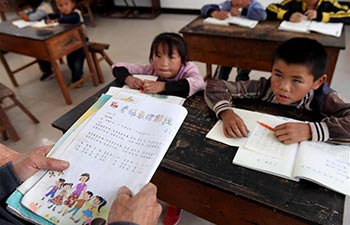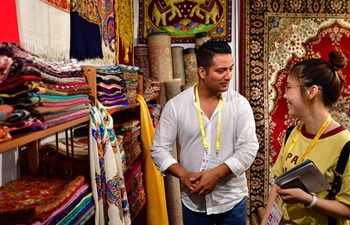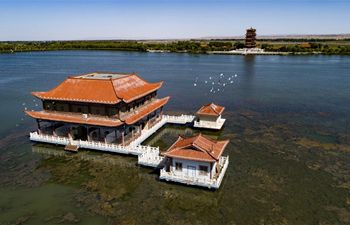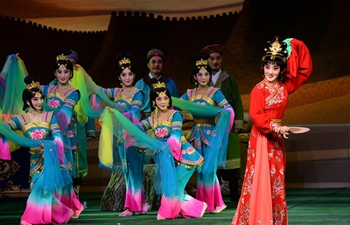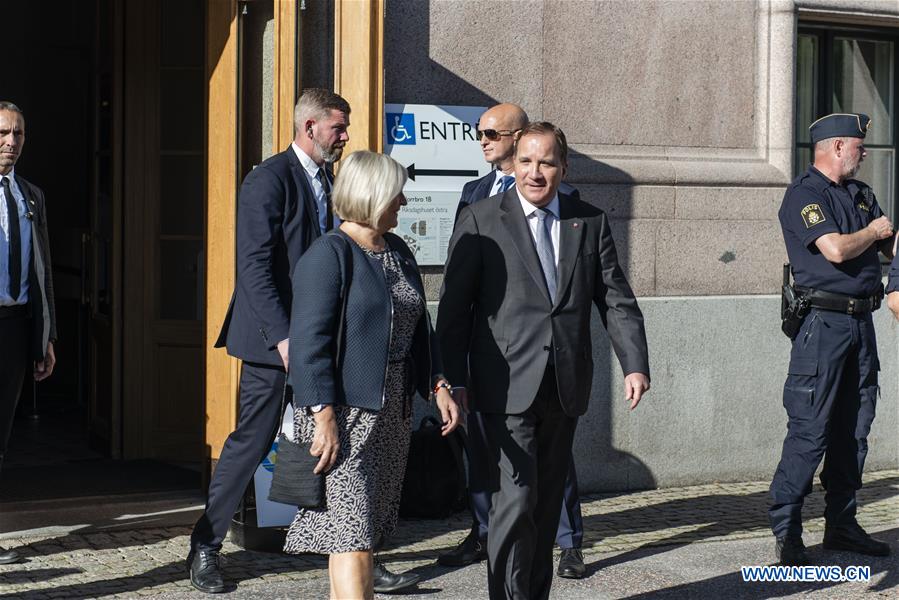
Prime Minister of Sweden Stefan Lofven (front R) and his wife Ulla Lofven walk out a polling station after casting their votes in Stockholm, Sweden, Sept. 9, 2018. Polling stations opened in Sweden on Sunday morning as the country headed for an election that looks set to turn the nationalist Sweden Democrat Party into political kingmakers. (Xinhua/Shi Tiansheng)
STOCKHOLM, Sept. 9 (Xinhua) --- Polling stations opened in Sweden on Sunday morning as the country headed for an election that looks set to turn the nationalist Sweden Democrat Party into political kingmakers.
The final opinion polls published before Election Day predicted a neck-to-neck race between the center-left and center-right blocs, with the current government coalition partners -- the Social Democrats and the Greens -- along with the Left Party polling at 39.9 percent in a survey conducted by Novus on behalf of Swedish Television. The four-party center-right Alliance was just behind, at 38.5 percent.
In the same Novus poll, the Sweden Democrats came out second in terms of single party's support, with 19.1 percent of respondents opting for the party, which is often labeled as populist and far right. They have vowed to be tougher on immigration than any other political party in Sweden and want the Scandinavian nation to leave the European Union.
In other recent polls, the Sweden Democrats have scored between around 16 and 25 percent, which would signify a significant boost compared to their 2014 election result, when they gained nearly 13 percent of the vote.
Immigration and integration have been central themes in Sweden's shorter-than-usual election campaign, with Election Day now scheduled on the second rather than the third Sunday of September. Another Novus poll, published on Sept. 6, showed that immigration/integration is the second most important issue for Swedish voters, behind healthcare and ahead of schools/education.
Issues like crime and law and order have also dominated debates, especially after a series of car arson attacks in western Sweden last month and with gun violence on the rise, particularly in so-called "vulnerable areas" that are marred by social exclusion and relatively high crime rates. However, climate change also shot to prominence following this summer's unusually high temperatures and dramatic wildfires.
The Sweden Democrats, who want Sweden, at least temporarily, to stop taking in quota refugees as well as asylum seekers from countries outside of the Nordic region, have dominated the national conversation as the other seven parliamentary parties have positioned themselves against them, vowing not to form a government, or negotiate, with the party that is led by Jimmie Akesson.
With neither political bloc set to gain a majority of the vote and neither willing to secure a majority by collaborating with the Sweden Democrats, the government formation question is still up in the air, with widespread talk of tactical voting among Swedes. Analysts and commentators speculate that there will be political bargaining across the left-right divide after the votes are counted.
Sweden faced a similar deadlock situation in 2014, when a snap election was avoided because the center-right Alliance (made up of the Moderates, the Center Party, the Liberals and the Christian Democrats) decided to abstain from blocking the Social Democrat-Green Party budget in a deal known as the December Agreement. This time around, neither bloc has said they are willing to repeat such a deal, which proved controversial among the electorate and, some analysts say, helped boost support for the Sweden Democrats, cementing their self-appointed status as Sweden's "only opposition party".
The Sweden Democrats, on their part, could end up with a key role in shaping the next government, even if they are unlikely to be part of one, as they may have the power to bring down any minority government that they oppose.
Under Sweden's negative parliamentarian system, a government does not need to have a majority in favor of it, as long as there is no majority against it. If the current Prime Minister Stefan Lofven is asked by the Speaker of Parliament to form a government following the election and the Sweden Democrats vote against it, the Speaker may then turn to Ulf Kristersson, the leader of the opposition, instead. The Sweden Democrats could support Kristersson's government or simply abstain from voting, thereby offering it passive support.
The potential post-election scenarios and what role the Sweden Democrats will play have also dominated debates and party-leader interviews during the campaign. Akesson and his party again dominated the news over the weekend after the national broadcaster SVT, in an unprecedented move, made a statement against what they called a "great generalization" on Akesson's behalf. That was after he sparred with other party leaders in a televised debate on Friday evening over unemployment rates among immigrants, suggesting it is hard for newcomers to get jobs because they "do not fit in" and "are not Swedish". Akesson added that immigrants must get opportunities to become Swedish and to integrate into the labor market and wider society.
After SVT refused to retract their statement, the Sweden Democrats decided to boycott the state broadcaster for the remainder of the campaign, canceling TV appearances on Election Day.
The Sweden Democrat Party first entered parliament in 2010 and was founded 30 years ago by individuals with links to neo-Nazi movements. The party now operates a "zero-tolerance policy" on racism but has also ousted several representatives recently who were found to have made racist remarks online.
The party gained growing support following the 2015 refugee crisis, when over 160,000 people applied for asylum in Sweden, a country with a population of 10 million. Since then, the government has tightened immigration controls and laws, but the latest prognosis from the Swedish Migration Agency shows that 122,000 people are expected to apply for asylum in Sweden between 2018 and 2021. A further 181,000 look set to arrive under family reunification rules, though that figure includes relatives of people born in Sweden. The total number of people who are expected to be granted asylum or to receive residence permits under family reunification rules between 2018 and 2021 is 150,000.
While the Social Democrats on Sunday may get the lowest share of the vote in more than a century and the main opposition, the conservative Moderates, look set to lose their position as Sweden's second biggest party, smaller parties are doing comparatively well. Polls suggest that support for the ex-Communist Left Party could double compared to the 2014 election, and the Center Party -- an agrarian party that has shifted its focus towards free-market economics and in this election has staked its claims as the most liberal on immigration out of all the four opposition Alliance parties -- is now the fifth most popular party. That is according to the Sept. 6 Novus poll.
Exit polls are expected shortly after 8 p.m. on Sunday, when polling closes across the country.

